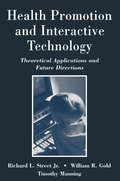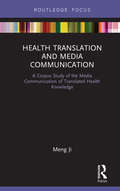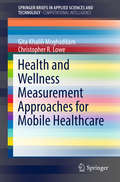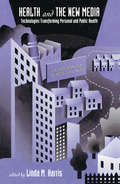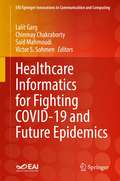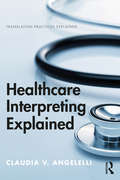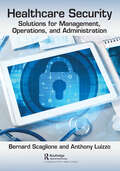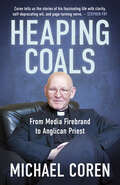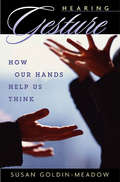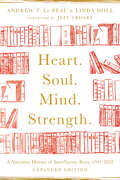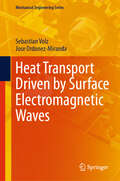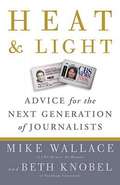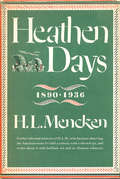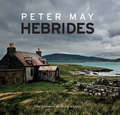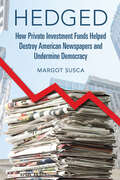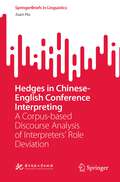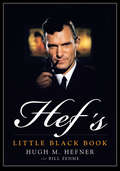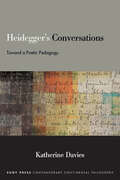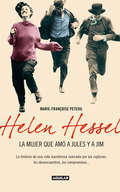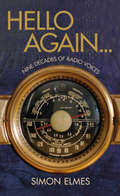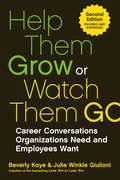- Table View
- List View
Health Promotion and Interactive Technology: Theoretical Applications and Future Directions (Routledge Communication Series)
by Richard L. Street William R. Gold Timothy ManningThis book's purpose is to offer various perspectives relating to the development, effectiveness, and implementation of interactive computing technology for health promotion--programs and interventions aimed at improving various health-related outcomes such as involvement in care, quality of life, adherence, disease management, healthy lifestyle, and more. Its coverage includes: *conceptual foundations for examining how characteristics of media, messages, and users relate to one another and how interactive media can effectively and appropriately promote health outcomes; *examinations of the development, utilization, and evaluation of specific computer applications for health promotion featuring discussions of the theoretical rationale for the program, the targeted audience, research on the program's effectiveness, and implications for future program development; and *analyses of critical issues such as potential benefits and limitations of technology on the delivery of care, institutional obstacles to the adoption of computing technology, and prospects for integrating information technology into the health system.
Health Translation and Media Communication: A Corpus Study of the Media Communication of Translated Health Knowledge (Routledge Studies in Empirical Translation and Multilingual Communication)
by Meng JiCross-sectoral interaction and cooperation in the communication of nutritional health risks represents a strategic research area among national governments and international health authorities. The key research question this book addresses is whether and how different industrial sectors interact with each other in the communication and industrial utilisation of health research findings. Through the introduction and exploration of large-scale industry news and digital media resources, this book systematically analyses a range of digital news genres and identifies new and growing trends of inter-sectoral interaction around the communication of nutritional health in the Chinese language at both international and national levels. This book argues that cross-sectoral interaction can be explored to identify areas that require policy intervention to increase the efficiency and effectiveness of current health communication and promotion. Inter-sectoral interaction can also provide incentives to develop new social programmes and business models to innovate and transform traditional industrial sectors.
Health and Wellness Measurement Approaches for Mobile Healthcare (SpringerBriefs in Applied Sciences and Technology)
by Gita Khalili Moghaddam Christopher R. LoweThis book reviews existing sensor technologies that are now being coupled with computational intelligence for the remote monitoring of physical activity and ex vivo biosignatures. In today’s frenetic world, consumers are becoming ever more demanding: they want to control every aspect of their lives and look for options specifically tailored to their individual needs. In many cases, suppliers are catering to these new demands; as a result, clothing, food, social media, fitness and banking services are all being democratised to the individual. Healthcare provision has finally caught up to this trend and is currently being rebooted to offer personalised solutions, while simultaneously creating a more effective, scalable and cost-effective system for all. The desire for personalisation, home monitoring and treatment, and provision of care in remote locations or in emerging and impoverished nations that lack a fixed infrastructure, is leading to the realisation that mobile technology might be the best candidate for achieving these goals. A combination of several technological, healthcare and financial factors are driving this trend to create a new healthcare model that stresses preventative ‘health-care’ rather than ‘sick-care’, and a shift from volume to value. Mobile healthcare (mhealth), which could also be termed the “internet of people”, refers to the integration of sensors and smartphones to gather and interpret clinical data from patients in real-time. Most importantly, with an ageing population suffering multiple morbidities, mhealth could provide healthcare solutions to enhance chronically ill patients’ quality of life.
Health and the New Media: Technologies Transforming Personal and Public Health (Routledge Communication Series)
by Linda M. HarrisThis book presents an evaluation framework for assessing the impact of the new media on the health care system by juxtaposing characteristics of emerging information and communication technologies (interactive, seamlessly connected, and user-driven) and health care objectives (to increase access, improve quality, and manage costs). Each chapter provides a unique set of tools and perspectives on how to harness these new media to improve individual health and the health care delivery system. This innovative volume has also stimulated the creation of a "Forum on Health and the New Media" on the World Wide Web (http://Health.Dartmouth.edu/NewMedia/). The forum offers highlights of the book as well as links to the authors and related web sites.The volume is divided into six sections as follows: *The "Overview" juxtaposes characteristics of the new media (interactive, connected, and user-driven) with the three criteria for health care improvement: increased access, improved quality, and cost management. It offers a New Media and Health Care matrix of criteria for building and evaluating emerging health care systems.*The "Delivery" -- how new media can enhance the delivery of health care -- includes chapters on: managed care, demand management and self-care, telemedicine for rural residents, and how the Internet can be used to facilitate collaboration among health researchers and providers.*Health Information -- the life blood of health care -- addresses the potential for: extending the traditional flow of health information (from researchers to providers) to reach patients who want to share in decisions about their care; and the federal government's role in providing health information to the public.*Health Education discusses: integrating multimedia health programming for public schools; using networked multimedia and simulation technologies and new learning theories that promise to transform public health education; and educating health providers and patients through interactive media and drama.*Potholes Along the Highway provides a sobering balance to otherwise rather optimistic assumptions that a national information infrastructure will be forthcoming. *The New Media: Annotated Glossary provides computing and networking technology tools for readers who are not fluent in cyberlanguage.
Healthcare Informatics for Fighting COVID-19 and Future Epidemics (EAI/Springer Innovations in Communication and Computing)
by Chinmay Chakraborty Lalit Garg Saïd Mahmoudi Victor S. SohmenThis book presents innovative solutions utilising informatics to deal with various issues related to the COVID-19 outbreak. The book offers a collection of contemporary research and development on the management of Covid-19 using health data analytics, information exchange, knowledge sharing, the Internet of Things (IoT), and the Internet of Everything (IoE)-based solutions. The book also analyses the implementation, assessment, adoption, and management of these healthcare informatics solutions to manage the pandemic and future epidemics. The book is relevant to researchers, professors, students, and professionals in informatics and related topics.
Healthcare Interpreting Explained (Translation Practices Explained)
by Claudia V. AngelelliHealthcare Interpreting Explained is the first comprehensive user-friendly book on the practice of medical/healthcare interpreting. Written by a leading world authority and drawing on research carried out in Europe, the United States, Australia and Asia, this process-focussed text goes beyond terms and concepts to cover medical discourse, ethics and protocol, professionalization, cognitive factors, problem-solving strategies, assessment and more. Including summaries, tasks, further reading and a range of real-world examples, as well as audio files on the Translation Studies Portal, this is the essential text for all students and practicing interpreters in the areas of medical and healthcare interpreting.
Healthcare Security: Solutions for Management, Operations, and Administration
by Bernard J. Scaglione Anthony LuizzoHealthcare is on a critical path, evolving with the introduction of Obama Care and now COVID-19. How will healthcare and specifically healthcare security adapt over the next few years? What tools will be necessary for healthcare security professionals and all security professionals to meet the demands of the transforming security environment? Security professionals need new tools and programs to adapt security services to the “New Normal.” As healthcare emerges from pandemic threats, active shooter and workplace violence will re-emerge and new threats related to civil unrest, fraud, mergers, and further financial struggles will change how healthcare security will function. Healthcare Security: Solutions for Management, Operations, and Administration provides a series of articles related to the management and operations of healthcare security which will assist healthcare security professionals in managing the “New Normal” now and into the future. It is a collection of previously published articles on healthcare security and general security covering various topics related to the management of healthcare security and provides information on general security operations. It also includes unconventional topics that are necessary in the administration of healthcare security such as auditing principles, fraud prevention, investigations, interview and interrogation techniques, and forensics.
Healthy Conflict, Peaceful Life: A Biblical Guide for Communicating Thoughts, Feelings, and Opinions with Grace, Truth, and Zero Regret
by Donna JonesAuthor, speaker, and pastor's wife Donna Jones gives women a practical, biblical blueprint for making regret-free choices in the middle of real-life conflict so they can exchange relational turmoil for personal and relational peace.We've all had moments where we look back on a conflict, shake our heads, and think, why did I handle it that way?With three decades of ministry experience, Donna Jones has had a front-row seat to--and been in the middle of--all kinds of conflict and she understands the regret, guilt, heartache, and hurt conflict can produce. But she also knows it's possible for God to use those chaotic, painful moments and turn them into opportunities for better connection with those around us. With encouragement, warmth, and wisdom, Donna shows readers how to navigate the stressful confusion conflict can bring and helps them todiscover the single most important quality necessary to handle conflict well;communicate thoughts, feelings, and opinions with grace, truth, and zero regret;be equipped to handle conflict in a God honoring way by exchanging conflict styles that hurt with conflict styles that heal; identify common conflict mistakes and prevent unnecessary disagreements and defeat; andstop being pulled into other people's drama and remain calm in the midst of chaos. Whether readers are dealing with daily disagreements or occasional blowups, Healthy Conflict, Peaceful Life offers them a new paradigm, one where they learn how to honor God when they've been hurt, communicate when they'd rather retaliate, and move toward others when it seems easier to run away.
Heaping Coals: From Media Firebrand to Anglican Priest
by Michael Coren“Coren tells us the stories of his fascinating life with clarity, self-deprecating wit, and page-turning verve.” — STEPHEN FRY From England’s working class to high profile media personality, Michael Coren charts his encounters with people of faith, fame, and fortune.Growing up in a blue-collar mixed-religion family then entering a career in media, Michael Coren was, and in some ways still is, the consummate outsider. In Heaping Coals, he writes of his life leading up to entering the seminary, being ordained, and his early successes as a journalist, encountering Oscar-winning writers and celebrities. After marrying and settling in Canada, Coren became a darling of the Christian right with his TV and radio shows and syndicated column. His shift to more progressive Christianity and politics embodies Romans 12:20 — heaping coals onto the heads of one’s enemies — and charts the returning of good for evil through a process of self-reflection. From outsider to institutional mainstay to penitent, Coren shares not just a humble admission of fault but an articulate and convincing account of one man’s spiritual awakening.
Hearing Gesture: How Our Hands Help Us Think
by Susan Goldin-MeadowMany nonverbal behaviors—smiling, blushing, shrugging—reveal our emotions. One nonverbal behavior, gesturing, exposes our thoughts. This book explores how we move our hands when we talk, and what it means when we do so. Susan Goldin-Meadow begins with an intriguing discovery: when explaining their answer to a task, children sometimes communicate different ideas with their hand gestures than with their spoken words. Moreover, children whose gestures do not match their speech are particularly likely to benefit from instruction in that task. Not only do gestures provide insight into the unspoken thoughts of children (one of Goldin-Meadow’s central claims), but gestures reveal a child’s readiness to learn, and even suggest which teaching strategies might be most beneficial. In addition, Goldin-Meadow characterizes gesture when it fulfills the entire function of language (as in the case of Sign Languages of the Deaf), when it is reshaped to suit different cultures (American and Chinese), and even when it occurs in children who are blind from birth. Focusing on what we can discover about speakers—adults and children alike—by watching their hands, this book discloses the active role that gesture plays in conversation and, more fundamentally, in thinking. In general, we are unaware of gesture, which occurs as an undercurrent alongside an acknowledged verbal exchange. In this book, Susan Goldin-Meadow makes clear why we must not ignore the background conversation.
Heart. Soul. Mind. Strength.: A Narrative History of InterVarsity Press, 1947-2022
by Andrew T. Le Peau Linda Doll"Some publishers tell you what to believe. Other publishers tell you what you already believe. But InterVarsity Press helps you believe."J. I. PackerThe history of evangelicalism cannot be understood apart from the authors and books that shaped it. Over the past century, leading figures such as pastor-scholar John Stott, apologist James W. Sire, evangelist Rebecca Manley Pippert and spiritual formation writer Eugene Peterson helped generations of readers to think more biblically and engage the world around them. For many who take their Christianity seriously, books that equip them for a life of faith have frequently come from one influential publisher: InterVarsity Press.Andy Le Peau and Linda Doll provide a narrative history of InterVarsity Press, from its origins as the literature division of a campus ministry to its place as a prominent Christian publishing house. Here is a behind-the-scenes look at the stories, people, and events that made IVP what it is today. Recording good times and bad, celebrations and challenges, they place IVP in its historical context and demonstrate its contribution to the academy, church and world.In honor of IVP's seventy-fifth anniversary, senior editor Al Hsu has updated this edition with new content, bringing the story up to 2022 and including stories about contemporary authors such as Esau McCaulley and Tish Harrison Warren. As IVP continues to adapt to changes in publishing and the global context, the mission of publishing thoughtful Christian books has not changed. IVP stands as a model of integrative Christianity for the whole person—heart, soul, mind and strength.
Heat Transport Driven by Surface Electromagnetic Waves (Mechanical Engineering Series)
by Sebastian Volz Jose Ordonez-MirandaThis book leads the reader from the well-established wave description of polaritons to their particle description to quantify the polariton contribution to the heat transport along polar and metallic nanofilms, nanowires, and cavities. Over the last few decades, the surface electromagnetic waves propagating along the interface of metals (plasmon polaritons) and polar dielectrics (phonon polaritons) have been widely studied to generate and guide energy currents. And while the optical generation of these polaritons at a given frequency is well known and exploited nowadays, their thermal excitation and propagation in a broad frequency spectrum, explored in detail in this volume, have only more recently been emerging as an effective way to enhance conductive and radiative heat currents. Written by the foremost experts and researchers in nanoscale heat transport, this book consolidates in a single comprehensive view, the findings on surface electromagnetic waves as the 4th heat carriers, besides phonons, photons, and electrons.
Heat and Light: Advice for the Next Generation of Journalists
by Mike Wallace Beth KnobelPacked with practical wisdom, rubber-on-the-road tips, and never-before-heard anecdotes, this guide to creating good journalism is required reading for any aspiring reporter and editor.
Heathen Days: 1890-1936 (H.L. Mencken's Autobiography)
by H. L. MenckenWith a style that combined biting sarcasm with the "language of the free lunch counter," Henry Louis Mencken shook politics and politicians for nearly half a century. Now, fifty years after Mencken's death, the Johns Hopkins University Press announces The Buncombe Collection, newly packaged editions of nine Mencken classics: Happy Days, Heathen Days, Newspaper Days, Prejudices, Treatise on the Gods, On Politics, Thirty-Five Years of Newspaper Work, Minority Report, and A Second Mencken Chrestomathy. In the third volume of his autobiography, H. L. Mencken covers a range of subjects, from Hoggie Unglebower, the best dog trainer in Christendom, to his visit to the Holy Land, where he looked for the ruins of Gomorrah.
Hebrides
by Peter May David WilsonSince the publication of The Blackhouse in 2011, the books of Peter May's groundbreaking Lewis Trilogy have enthralled millions of readers around the world with powerfully evocative descriptions of the Outer Hebrides.From its peat bogs and heather-coated hills, from its weather-beaten churches and crofters cottages to its cold clear rills choked with rainwater, the islands off the northwest coast of Scotland have been brought to vivid life by this accomplished novelist.Now, Peter May and photographer David Wilson present a photographic record of the countless locations around the Hebridean archipelago that so inspired May when he was bringing the islands of detective Fin McLeod's childhood to the page. From the tiny southern island of Barra to the largest and most northern island of Lewis, travel the storm-whipped North Atlantic scenery with May as he once again strolls the wild and breathtaking countryside that gave birth to his masterful trilogy of novels.
Hedged: How Private Investment Funds Helped Destroy American Newspapers and Undermine Democracy (The History of Media and Communication)
by Margot SuscaThe untold history of an American catastrophe The ultrawealthy largely own and guide the newspaper system in the United States. Through entities like hedge funds and private equity firms, this investor class continues to dismantle the one institution meant to give voice to average citizens in a democracy. Margot Susca reveals the little-known history of how private investment took over the newspaper industry. Drawing on a political economy of media, Susca’s analysis uses in-depth interviews and documentary evidence to examine issues surrounding ownership and power. Susca also traces the scorched-earth policies of layoffs, debt, cash-outs, and wholesale newspaper closings left behind by private investors and the effects of the devastation on the future of news and information. Throughout, Susca reveals an industry rocked less by external forces like lost ad revenue and more by ownership and management obsessed with profit and beholden to private fund interests that feel no responsibility toward journalism or the public it is meant to serve.
Hedges in Chinese-English Conference Interpreting: A Corpus-based Discourse Analysis of Interpreters’ Role Deviation (SpringerBriefs in Linguistics)
by Juan HuThis book explored interpreters’ role when interpreting for Chinese government press conference and discovered the role deviation of conference interpreters in Chinese–English conference interpreting, by taking corpus-based approach to analyze hedges in interpreting discourse. So far, the discovery of role deviation for conference interpreters in this book is relevantly fresh in conceptual, empirical, and methodological aspects, against the background that conference interpreters are traditionally assumed to be invisible and passive “non-person.” Arguably, this book revisited and renewed the concept of interpreters’ role, offered a role theory-based theoretical framework in some potential issues in future studies, designed a novel empirical route by using hedges as the intervening points to gain insight into interpreters’ role, and applied Python-a new natural language processing programming in data extraction. Thus, this book is believed to contribute some new conceptual, theoretical as well as methodological significance to the future studies on interpreters’ role and performance. This book is intended to act as a useful reference for scholars, practitioners, interpreters, graduate and advanced undergraduate students, and anyone who shows interest in interpreters’ role and performance, corpus-based interpreting product.
Hef's Little Black Book
by Bill Zehme Hugh M. HefnerThe legendary founder of Playboy magazine brings readers inside his legendary, decadent world in this “breezy, charming chronicle” (Time Out New York).With the iconic Playboy magazine, the legendary Playboy Mansion, and the many other ventures he created as head of Playboy Enterprises, Hugh Hefner conjured a vision of the Good Life as no one else had dared. Now the Master Playboy of the Western World shares the secrets that have for generations made him the envy of all free-thinking men and women. Hef's Little Black Book captures lifestyle of Hugh M. Hefner as never before, with a treasure trove of urbane lore, wry advice, and time-honored wisdom spanning the realms of romance, hedonism, ambition, business, dreams, and, of course, sex. Accompanied by tantalizing, never-before-seen photographs, the gateway to Hugh Hefner's Dream World of Cool awaits you. If you don't swing, don't ring.
Heidegger's Conversations: Toward a Poetic Pedagogy (SUNY series in Contemporary Continental Philosophy)
by Katherine DaviesReading Martin Heidegger's five conversational texts together for the first time, Heidegger's Conversations elaborates not only what Heidegger thought but how he did so by attending to the philosophical possibilities of the genre of these under-studied texts written between 1944 and 1954. Though he wrote little on the topic of teaching and learning explicitly, Katherine Davies shows Heidegger performed an implicit poetic pedagogy in his conversations that remains to be recognized. Heidegger launched an experimental attempt to enact a learning of non-representational, non-metaphysical thinking by cultivating a distinctly collaborative sensitivity to the call of the poetic. Davies illustrates how each conversation emphasizes a particular pedagogical element—non-oppositionality, making mistakes, thinking in community, poetic interpretation, and the dangers of such pedagogy—which together constitute the developmental arc of these texts. Whether Heidegger is revising or reinforcing his own earlier pedagogical practices, Davies argues that attending to the dramatic staging of the conversations offers a distinct vantage point from which to contend with Heidegger's philosophy and politics in the post-war period.
Heidegger, Translation, and the Task of Thinking
by F. SchalowNumerous volumes have been written on the philosophy of Martin Heidegger, and new translations of his writings appear on a regular basis. Up to now, however, no book has addressed the connections between Heidegger's thought and the hermeneutic methodology involved in translating his works - or any other text. Gathering essays by internationally recognized scholars, this volume examines the specific synergy that holds between Heidegger's thinking and the distinctive endeavor of translation. Heidegger, Translation, and the Task of Thinking: Essays in Honor of Parvis Emad offers scholars and students alike a rare journey into the insights and intricacies of one of the greatest philosophers of the twentieth century. The book also pays homage to Parvis Emad, Professor Emeritus of Philosophy at De Paul University, founder of the journal Heidegger Studies and a renowned translator of Heidegger's writings. Heidegger, Translation, and the Task of Thinking: Essays in Honor of Parvis Emad provides a uniquely focused perspective on Heidegger's thought, and delves into the strategies and controversies that attend all attempts to translate his most complex and challenging texts, including his seminal works Contributions to Philosophy and Mindfulness. Accordingly, this book will be of great interest and benefit to anyone working in the fields of phenomenology, hermeneutics, or Heidegger studies.
Helen Hessel, la mujer que amó a Jules y Jim: La historia de una vida asombrosa marcada porlas rupturas, los desencuentros, los compromisos...
by Marie-Françoise PeteuilHelen Hessel, una vida extraordinaria. La historia de una vida asombrosa marcada por las rupturas, los desencuentros y los compromisos. Pintora, periodista, escritora, musa, feminista, resistente, traductora o filósofa... No es fácil reducirla a una sola identidad. Helen Hessel encauzó su vida haciendo gala de una fuerza y una audacia insólitas. Se casó dos veces con el escritor judío-alemán Fran Hessel (Jules), amigo íntimo de Walter Benjamin, y se divorció otras dos, y con él tuvo dos hijos: Ulrich y Stéphane. Mantuvo una relación extramarital con el también escritor Henri-Pierre Roché (Jim), un amor loco que se prolongó durante quince años. La existencia de Helen se construye en función de rupturas, desviaciones y compromisos. Peligrosa, provocadora, insoportable, vital, abandonó a su familia, fue granjera, construyó una casa en el Báltico, convirtió su casa de París en un bastión de la intelectualidad alemana, viajó solaa Berlín para rescatar a su ex marido de la muerte y junto a Aldoux Huxley hizo un llamamiento a las mujeres alemanas para que abandonaran el país. Marie-Françoise Peteuil construye, gracias a una excelsa documentación y al valioso testimonio de su hijo, Stéphane Hessel, autor de ¡Indignaos!, la trayectoria vital de una mujer excepcional que amó hasta la locura y que por encima de todo fue siempre fiel a ella misma. Helen Hessel es el álter ego del personaje de Catherine de la clásica película de Truffaut Jules y Jim.
Hello Again: Nine decades of radio voices
by Simon ElmesIt’s now ninety years since the BBC made its first broadcast and the British love affair with radio began.This book is a journey through that fascinating history and a celebration of the many wonderful voices that were part of it: Marion Cran, who pioneered the first gardening programme in the 1920s; The Goons and Kenneth Horne, comedy greats of the 1950s; John Peel, Alan Freeman, Kenny Everett and other heroes of the pirate stations; all the way up to Eddie Mair, Fi Glover and Danny Baker, the much-loved voices of today. A delightful blend of insight, history and nostalgia, Hello Again will appeal to any radio aficionado.
Hello Life!
by Marcus ButlerThe Sunday Times number 1 bestseller.Marcus Butler's irreverent YouTube channel has long combined laughs and comedy sketches with thoughts on more serious issues. What sets him apart from the rest is his ability to mix light-hearted banter with a deep empathy for the problems facing young people today. Thanks to his experiences of family illness, his parents' divorce, weight issues and catastrophic hair days, Marcus is in a unique position to share everything he has learned about healthy living, relationships and dealing with the daily pressures life throws at us all. Working with journalist and writer Matt Allen, in HELLO LIFE! his part-autobiography, part-self help guide Marcus shares his trademark big-brotherly advice and unveils his roadmap to success for anyone navigating the trickier aspects of modern living. Funny, cool, fully illustrated and totally readable, this book is the ultimate must-have for fans of Marcus Butler.
Hello Life!
by Marcus ButlerThe Sunday Times number 1 bestseller.Marcus Butler's irreverent YouTube channel has long combined laughs and comedy sketches with thoughts on more serious issues. What sets him apart from the rest is his ability to mix light-hearted banter with a deep empathy for the problems facing young people today. Thanks to his experiences of family illness, his parents' divorce, weight issues and catastrophic hair days, Marcus is in a unique position to share everything he has learned about healthy living, relationships and dealing with the daily pressures life throws at us all. Working with journalist and writer Matt Allen, in HELLO LIFE! his part-autobiography, part-self help guide Marcus shares his trademark big-brotherly advice and unveils his roadmap to success for anyone navigating the trickier aspects of modern living. Funny, cool, fully illustrated and totally readable, this book is the ultimate must-have for fans of Marcus Butler.
Help Them Grow or Watch Them Go: Career Conversations Organizations Need and Employees Want
by Beverly Kaye Julie Winkle GiulioniThe new edition of the bestselling employee development classic includes advice on talent retention in the gig economy, and a new chapter on creating a career development culture in your organization. Study after study confirms that career development is the single most powerful tool managers have for driving retention, engagement, productivity, and results. But most managers feel like they just don't have time for more meetings. This book offers a better way: frequent, short conversations with employees about their career goals that can be integrated seamlessly into the normal course of business. Beverly Kaye and Julie Winkle Giulioni identify three broad types of conversations that will increase employees' awareness of their strengths, weaknesses, and interests; point out where their organization and their industry are headed; and help them pull all of that together to design their personalized career plans. And the new chapter includes an assessment so you can measure how well your current culture supports employee development—and how to improve it.
